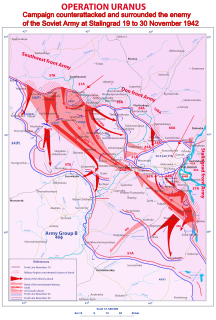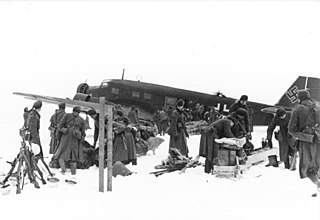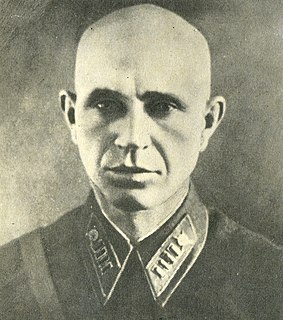| Look up Stalingrad in Wiktionary, the free dictionary. |
Stalingrad is a former name of Volgograd, a city in Russia.
Contents
Stalingrad may also refer to:
| Look up Stalingrad in Wiktionary, the free dictionary. |
Stalingrad is a former name of Volgograd, a city in Russia.
Stalingrad may also refer to:

The Battle of Stalingrad, was a major battle on the Eastern Front of World War II where Nazi Germany and its allies unsuccessfully fought the Soviet Union for control of the city of Stalingrad in Southern Russia. The battle was marked by fierce close-quarters combat and direct assaults on civilians in air raids. The Battle of Stalingrad was the deadliest battle to take place during the Second World War and is one of the bloodiest battles in the history of warfare, with an estimated 2 million total casualties. The battle today is universally regarded as a turning point in the war as it forced the Oberkommando der Wehrmacht to withdraw considerable military forces from other theaters of war to replace their losses on the eastern front. The victory at Stalingrad energized the Red Army and shifted the balance of power in the favor of the Soviets.

Volgograd, formerly Tsaritsyn (1589–1925), and Stalingrad (1925–1961), is the largest city and the administrative centre of Volgograd Oblast, Russia. The city lies on the western bank of the Volga, covering an area of 859.4 square kilometres, with a population of over 1 million residents. Volgograd is the fifteenth-largest city in Russia, the second-largest city on the Southern Federal District, and the fourth-largest city on the Volga.

Vasily Grigoryevich Zaitsev was a Soviet sniper during World War II. Between 22 September 1942 and 19 October 1942, he killed 40 enemy soldiers. Between 10 October 1942 and 17 December 1942, during the Battle of Stalingrad, he killed 225 enemy soldiers.

Operation Uranus was the codename of the Soviet Red Army's 19–23 November 1942 strategic operation on the Eastern Front of World War II which led to the encirclement of Axis forces in the vicinity of Stalingrad: the German Sixth Army, the Third and Fourth Romanian armies, and portions of the German Fourth Panzer Army. The Red Army carried out the operation at roughly the midpoint of the five-month long Battle of Stalingrad, aiming to destroy German forces in and around Stalingrad. Planning for Operation Uranus had commenced in September 1942, and developed simultaneously with plans to envelop and destroy German Army Group Center and German forces in the Caucasus. The Red Army took advantage of the German army's poor preparations for winter, and the fact that its forces in the southern Soviet Union were overstretched near Stalingrad, using weaker Romanian troops to guard their flanks; the offensive's starting points were established along the section of the front directly opposite Romanian forces. These Axis armies lacked heavy equipment to deal with Soviet armor.

Sir Antony James Beevor, is a British military historian. He has published several popular historical works on the Second World War and other wars during the 20th century.

Mamayev Kurgan is a dominant height overlooking the city of Volgograd in Southern Russia. The name in Russian means "tumulus of Mamai". The formation is dominated by a memorial complex commemorating the Battle of Stalingrad. The battle, a hard-fought Soviet victory over Axis forces on the Eastern Front of World War II, turned into one of the bloodiest battles in human history. At the time of its installation in 1967 the statue, named The Motherland Calls, formed the largest free-standing sculpture in the world; today it is the tallest sculpture of a woman in the world.

Vasily Semyonovich Grossman was a Soviet writer and journalist.

Pavlov's House was a fortified apartment building which Red Army defenders held for 60 days against the Wehrmacht offensive during the Battle of Stalingrad. The siege lasted from 27 September to 25 November 1942 and eventually the Red Army managed to relieve it from the siege.
The Southern Front was a front, a formation about the size of an army group of the Soviet Army during the Second World War. The Southern Front directed military operations during the Soviet occupation of Bessarabia and Northern Bukovina in 1940 and then was formed twice after the June 1941 invasion by Germany, codenamed Operation Barbarossa.

Operation Saturn, revised as Operation Little Saturn, was a Red Army operation on the Eastern Front of World War II that led to battles in the North Caucasus and Donets Basin regions of the Soviet Union from December 1942 to February 1943.

Markian Mikhaylovich Popov was a Soviet military commander, Army General, and Hero of the Soviet Union (1965).

Walther Kurt von Seydlitz-Kurzbach was a German general during World War II who commanded the LI Army Corps during the Battle of Stalingrad. At the end of the battle, he gave his officers freedom of action and was relieved of command. He assisted the Soviet Union as a prisoner-of-war. After the war, he was convicted by the Soviets of war crimes. In 1996, he was posthumously pardoned by Russia.

The Demyansk Pocket was the name given to the pocket of German troops encircled by the Red Army around Demyansk, south of Leningrad, during World War II's Eastern Front. The pocket existed mainly from 8 February to 21 April 1942.

Stalingrad is a narrative history written by Antony Beevor of the battle fought in and around the city of Stalingrad during World War II, as well as the events leading up to it. It was first published by Viking Press in 1998.
The Battle of Stalingrad (1942–1943), a battle on the Eastern Front of World War II, often regarded as the single largest and bloodiest battle in the history of warfare, and one of the most decisive battles of World War II, has inspired a number of media works.
Sasha Filippov was a spy for the Red Army during the Battle of Stalingrad.

Walter Heitz was a German general (Generaloberst) in the Wehrmacht during World War II who served as President of the Reich Military Court and commanded part of the 6th Army in the Battle of Stalingrad.

Major Nikolay Dmitrevich Dyatlenko was a Soviet officer, interrogator and translator who was part of a team that attempted to deliver a message of truce to the German Sixth Army at the Battle of Stalingrad in January 1943. He also acted as the translator at the interrogation of Field Marshal Friedrich Paulus a few weeks later.
The 266th Rifle Division was a rifle division of the Soviet Red Army during World War II. The 266th was formed three times during the war.

Leonty Nikolayevich Gurtyev was a Soviet military officer, known for his participation in the Second World War's Eastern front and most notably in the battle of Stalingrad.